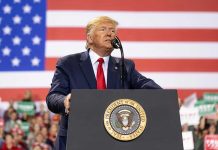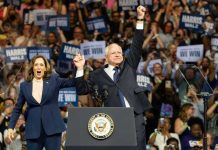
President Donald Trump’s controversial “Liberation Day” tariffs will remain in effect after a Senate vote ended in a rare 49-49 tie, revealing a growing Republican divide over his trade policies.
Key Takeaways
- The Senate rejected efforts to block President Trump’s emergency tariffs with a 49-49 tied vote after Vice President JD Vance cast the deciding vote to table the measure
- Three Republican Senators—Rand Paul, Susan Collins, and Lisa Murkowski—broke ranks to join Democrats in opposing the tariffs
- Key absences from Senators Mitch McConnell and Sheldon Whitehouse potentially altered the outcome of the vote
- The resolution aimed to terminate Trump’s national emergency declaration used to impose 10% tariffs on most U.S. trading partners
- Even with Senate passage, the measure faced little chance of success with House Republican leadership blocking floor consideration and a likely presidential veto
Senate Divided on Trump’s Tariff Emergency
The Senate’s deadlocked vote on President Trump’s emergency tariffs exposes growing Republican fractures over trade policy in the new administration. Senator Ron Wyden introduced the resolution as a “privileged” measure, which required a vote despite Republican control of the chamber. The effort to block the 10% tariffs on most U.S. trading partners fell short when Vice President JD Vance stepped in to break the tie, preserving Trump’s “Liberation Day” tariff policy that has become a cornerstone of his economic agenda since returning to office.
The vote highlighted an unusual congressional alliance, with three Republican senators—Rand Paul of Kentucky, Susan Collins of Maine, and Lisa Murkowski of Alaska—joining all present Democrats in opposing the tariffs. Notable absences included Republican leader Mitch McConnell and Democratic Senator Sheldon Whitehouse, whose votes could have altered the outcome. The split reflects broader concerns about economic impacts and presidential authority that transcend traditional party lines.
US Senate narrowly rejects bipartisan measure to block Trump tariffs.
— FinancialJuice (@financialjuice) April 30, 2025
Republican Dissent on Trade Policy
Senator Rand Paul’s opposition to the tariffs represents a traditional conservative stance that has become increasingly rare in the party. “You know, there was an old-fashioned conservative principle that believed that less taxes were better than more taxes,” Paul stated during debate, invoking historical principles against taxation without representation. His criticism highlights a philosophical divide within Republican ranks, where many members privately disagree with Trump’s trade approach but remain publicly supportive.
“It’s still a debate worth having,” Mr. Paul said, acknowledging the political challenge of opposing a policy championed by a president from his own party.
Senator Susan Collins echoed similar concerns while taking a more nuanced approach. “It’s not perfect, I think it’s too broad,” she explained about the tariff policy, suggesting that a more targeted approach would be preferable. The absence of Mitch McConnell from the vote has fueled speculation about his stance on the trade agenda, with reports indicating he has reservations about the broad application of tariffs but has avoided direct confrontation with the president.
Emergency Powers and Congressional Oversight
The resolution challenged not just the tariffs themselves but the president’s use of emergency powers to implement them. Democratic Senator Tim Kaine questioned the application of emergency powers to trade with allies like Canada, raising concerns about executive overreach. The debate reflects ongoing tension between congressional authority and presidential power in trade matters that has persisted across administrations, though with positions often reversed based on which party controls the White House.
“An emergency has been declared, as the Senator from Virginia remarked,” Rand Paul noted during floor debate, highlighting the constitutional questions at stake.
Despite the Senate action, the resolution faced limited prospects for ultimate success. House Republican leadership had already moved preemptively to block similar measures from reaching the floor, sparing members from politically difficult votes. The White House had also indicated a certain veto if the resolution were to pass both chambers, reinforcing President Trump’s commitment to his trade agenda as a central component of his economic nationalism platform in this new term.
Sources:
- Senate Rejects Bipartisan Measure to Undo Trump’s Tariffs – The New York Times
- Vance breaks key tie after Senate fails to reject Trump’s national emergency on tariffs














